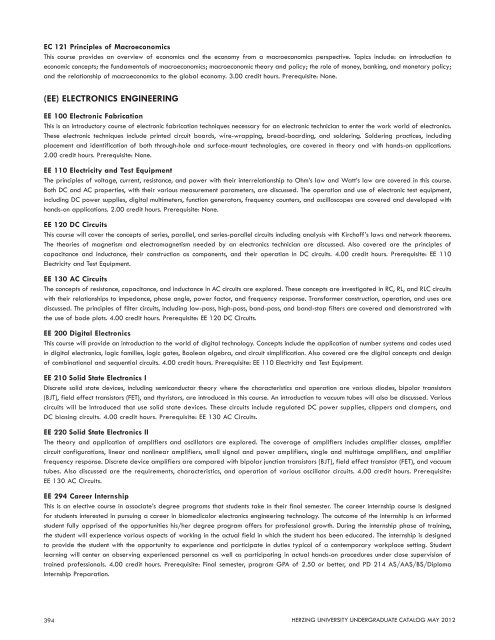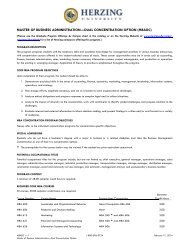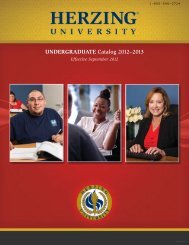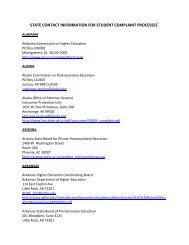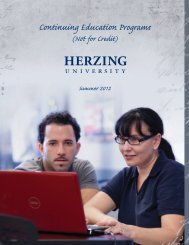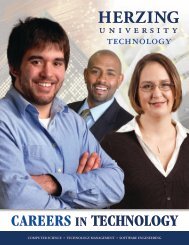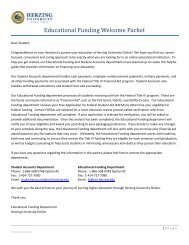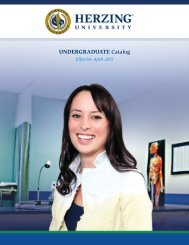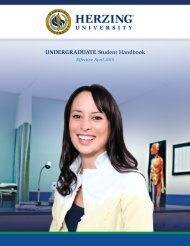Undergraduate - Herzing University
Undergraduate - Herzing University
Undergraduate - Herzing University
You also want an ePaper? Increase the reach of your titles
YUMPU automatically turns print PDFs into web optimized ePapers that Google loves.
EC 121 Principles of MacroeconomicsThis course provides an overview of economics and the economy from a macroeconomics perspective. Topics include: an introduction toeconomic concepts; the fundamentals of macroeconomics; macroeconomic theory and policy; the role of money, banking, and monetary policy;and the relationship of macroeconomics to the global economy. 3.00 credit hours. Prerequisite: None.(EE) electronics engineeringEE 100 Electronic FabricationThis is an introductory course of electronic fabrication techniques necessary for an electronic technician to enter the work world of electronics.These electronic techniques include printed circuit boards, wire-wrapping, bread-boarding, and soldering. Soldering practices, includingplacement and identification of both through-hole and surface-mount technologies, are covered in theory and with hands-on applications.2.00 credit hours. Prerequisite: None.EE 110 Electricity and Test EquipmentThe principles of voltage, current, resistance, and power with their interrelationship to Ohm’s law and Watt’s law are covered in this course.Both DC and AC properties, with their various measurement parameters, are discussed. The operation and use of electronic test equipment,including DC power supplies, digital multimeters, function generators, frequency counters, and oscilloscopes are covered and developed withhands-on applications. 2.00 credit hours. Prerequisite: None.EE 120 DC CircuitsThis course will cover the concepts of series, parallel, and series-parallel circuits including analysis with Kirchoff’s laws and network theorems.The theories of magnetism and electromagnetism needed by an electronics technician are discussed. Also covered are the principles ofcapacitance and inductance, their construction as components, and their operation in DC circuits. 4.00 credit hours. Prerequisite: EE 110Electricity and Test Equipment.EE 130 AC CircuitsThe concepts of resistance, capacitance, and inductance in AC circuits are explored. These concepts are investigated in RC, RL, and RLC circuitswith their relationships to impedance, phase angle, power factor, and frequency response. Transformer construction, operation, and uses arediscussed. The principles of filter circuits, including low-pass, high-pass, band-pass, and band-stop filters are covered and demonstrated withthe use of bode plots. 4.00 credit hours. Prerequisite: EE 120 DC Circuits.EE 200 Digital ElectronicsThis course will provide an introduction to the world of digital technology. Concepts include the application of number systems and codes usedin digital electronics, logic families, logic gates, Boolean algebra, and circuit simplification. Also covered are the digital concepts and designof combinational and sequential circuits. 4.00 credit hours. Prerequisite: EE 110 Electricity and Test Equipment.EE 210 Solid State Electronics IDiscrete solid state devices, including semiconductor theory where the characteristics and operation are various diodes, bipolar transistors(BJT), field effect transistors (FET), and thyristors, are introduced in this course. An introduction to vacuum tubes will also be discussed. Variouscircuits will be introduced that use solid state devices. These circuits include regulated DC power supplies, clippers and clampers, andDC biasing circuits. 4.00 credit hours. Prerequisite: EE 130 AC Circuits.EE 220 Solid State Electronics IIThe theory and application of amplifiers and oscillators are explored. The coverage of amplifiers includes amplifier classes, amplifiercircuit configurations, linear and nonlinear amplifiers, small signal and power amplifiers, single and multistage amplifiers, and amplifierfrequency response. Discrete device amplifiers are compared with bipolar junction transistors (BJT), field effect transistor (FET), and vacuumtubes. Also discussed are the requirements, characteristics, and operation of various oscillator circuits. 4.00 credit hours. Prerequisite:EE 130 AC Circuits.EE 294 Career InternshipThis is an elective course in associate’s degree programs that students take in their final semester. The career internship course is designedfor students interested in pursuing a career in biomedicalor electronics engineering technology. The outcome of the internship is an informedstudent fully apprised of the opportunities his/her degree program offers for professional growth. During the internship phase of training,the student will experience various aspects of working in the actual field in which the student has been educated. The internship is designedto provide the student with the opportunity to experience and participate in duties typical of a contemporary workplace setting. Studentlearning will center on observing experienced personnel as well as participating in actual hands-on procedures under close supervision oftrained professionals. 4.00 credit hours. Prerequisite: Final semester, program GPA of 2.50 or better, and PD 214 AS/AAS/BS/DiplomaInternship Preparation.394 <strong>Herzing</strong> UNIVERSITY undergraduate Catalog May 2012


